Top Things To Do In Panama In 2026
Panama’s geographic size is modest, but its global relevance is not. The country connects two oceans and two continents, operates on a dollarized...
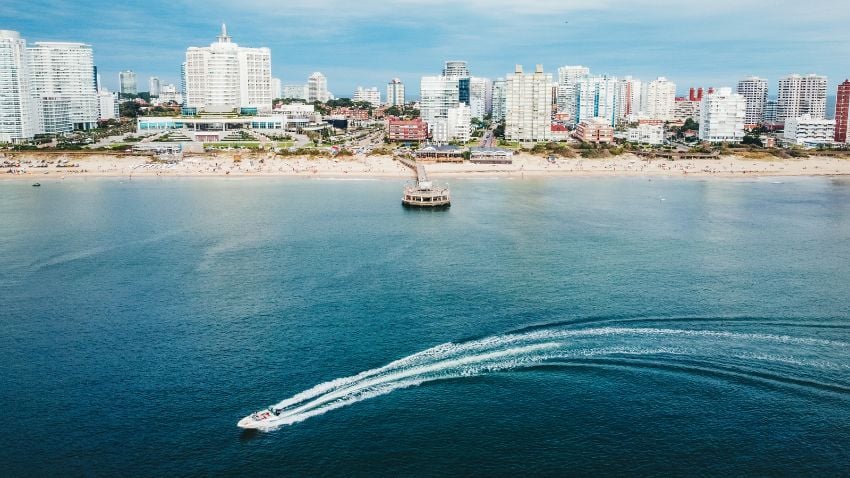
6 min read
Uruguay is the second smallest nation by land mass in South America, just behind Suriname. It is situated on the southeastern coast of South America, with a humid subtropical climate. While there are four distinct seasons, the overall ranges in temperature are fairly tame, and the climate is generally quite temperate. Aside from the mild weather, there is a distinct lack of natural disasters.
Almost half of the population of Uruguay lives in Montevideo, the capital, with about 1.8 million people. The total population of Uruguay is about 3.5 million people, making it the tenth smallest country in South America, just in front of Suriname, French Guiana and the Falkland Islands being the smallest.
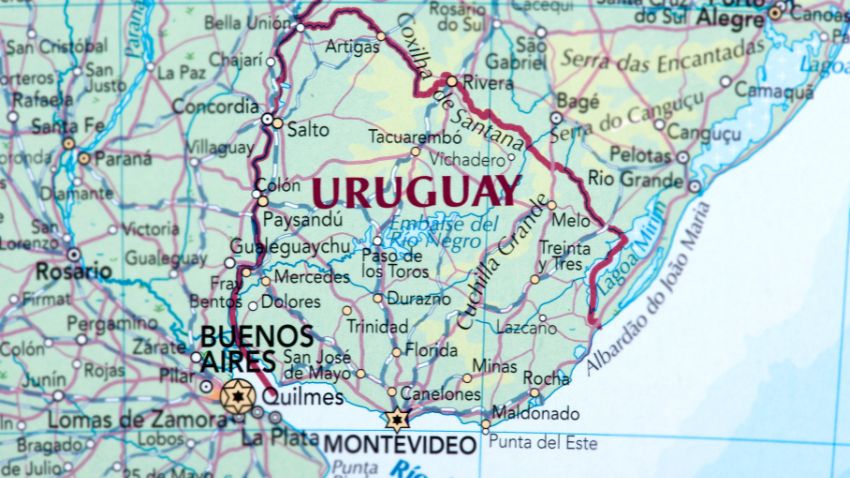
Map of Uruguay
The people are friendly, the food is delicious, and you can even enjoy some legal recreational marijuana if that is your thing. Uruguay was the first country in the world to legalize marijuana way back in 2013.
Uruguay was also ranked #1 in Latin America by the World Justice Project, a non-profit organization dedicated to promoting the rule of law. According to World Justice, Uruguay scored highly on fundamental rights, restrictions on government power, and the absence of government corruption.
The Heritage Institution also ranked Uruguay as the 27th economically freest country in the world, narrowly behind the United States and ahead of Japan, Belgium, and Spain.
If you’re looking to live in Uruguay, whether as a permanent resident or a temporary resident, keep reading.
Uruguay's residency is incredibly appealing for a multitude of reasons, making it a top choice for those seeking a new place to call home. Here are some of the key factors that contribute to its allure.
Uruguay is known for its openness to foreign residents. The government and its people are generally receptive and friendly, creating a welcoming environment for newcomers. With miles of pristine coastline along the Atlantic Ocean, Uruguay boasts some of South America's most beautiful beaches. Residents have easy access to these serene coastal destinations, perfect for relaxation and outdoor activities.
As a resident, you can enjoy various benefits, including access to Uruguay's stable economy, low crime rate, and well-established healthcare and education systems. Compared to many Western countries, Uruguay offers a relatively low cost of living. Housing, utilities, and everyday expenses are generally affordable, allowing residents to enjoy a comfortable lifestyle.
After several years of residency, individuals may become eligible for naturalization, which grants them full citizenship status. This opens up additional benefits, such as the right to vote and enhanced travel privileges. Uruguay offers options for family reunification, allowing spouses and dependent children to obtain residency permits along with the primary applicant. This ensures that families can stay together and enjoy the benefits of living there.
The government offices in Uruguay are known for their efficiency and transparency. Scheduling an appointment for residency-related matters is typically a smooth process.
Whether you're seeking a peaceful retirement, investment opportunities, or a change of scenery, Uruguay offers a stable and comfortable environment that has garnered the admiration of residents from around the world.
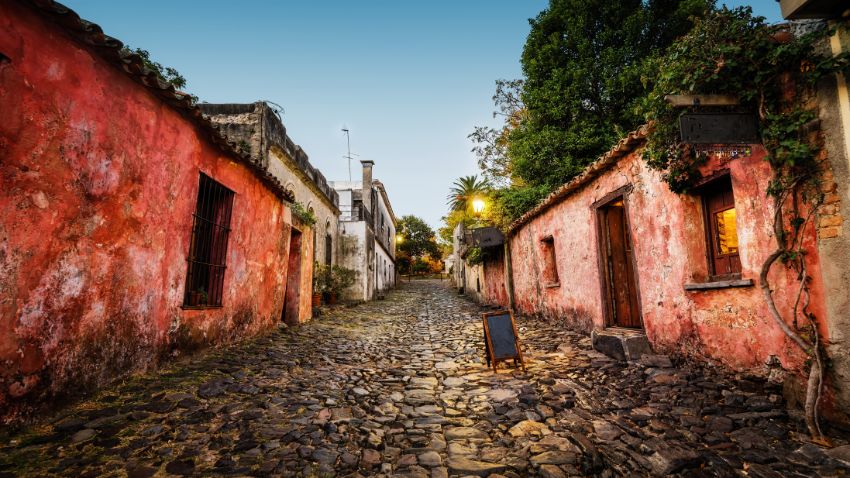
Cobblestone streets in Uruguay
The first step in applying for Uruguayan residency is to enter Uruguay on a tourist visa. After you have done that, you need to head on over to the Direccion Nacional de Migracion which is the government agency responsible for residency approval. Of course, you are going to have to have some documentation; here are the requirements:
One passport-size photo;
Identification document: valid and in good condition;
Valid Vaccination Certificate (COVID-19 is not required): According to Decree 136/2018, you must provide a certificate issued by a vaccination center in Uruguay, confirming that the foreigner complies with the Uruguayan vaccination schedule and that it is currently valid;
Valid and well-preserved identification document or passport of the Uruguayan family member;
Proof of relationship with the Uruguayan national: Either a valid birth certificate or a registered concubinage sentence demonstrating the connection with the Uruguayan national;
Criminal Record: Certificate of judicial, criminal, or police records at the national level from the country or countries where the applicant has resided in the last 5 years before entering Uruguay. For individuals over 18 years old.
Related content: Making Uruguay Your Home: An Overview Of Residency Types
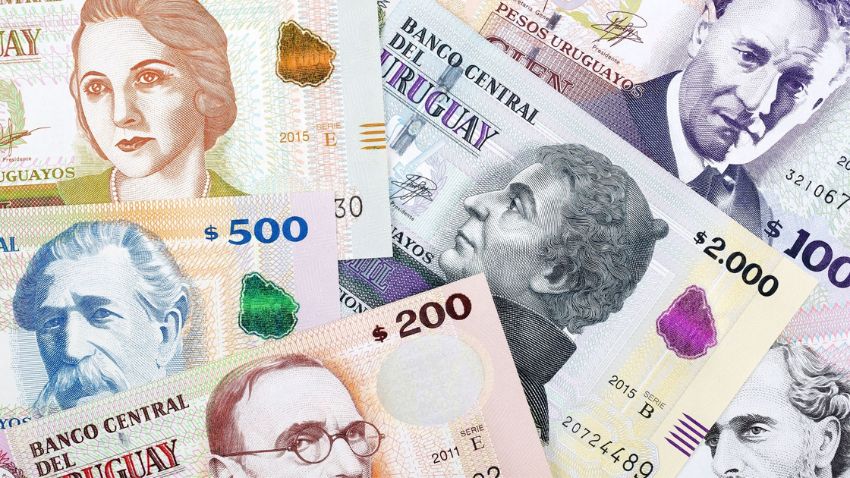
Uruguay Peso
It is important to note that permanent residency is restricted to people who actively intend to live in Uruguay. To that end, when applying for permanent residency, immigration officials will want to see that you have spent a significant amount of time in Uruguay since you entered. Once you have permanent residency you are free to come and go as you please, however, if you are gone from Uruguay for more than three years your residency will be revoked.
The cultural aspect of Uruguay plays a significant role in making residency appealing. With a rich history, diverse traditions, and a warm community spirit, the country welcomes newcomers with open arms. This cultural embrace encourages individuals to not only reside in Uruguay but also become an integral part of its social fabric.
The consulate services in Uruguay are instrumental in facilitating the residency process. These offices provide valuable information, guidance, and support to individuals navigating the application journey. The consulate serves as a bridge, connecting people from around the world to the opportunities and experiences that Uruguay has to offer.
An alternative to permanent residency is temporary residency. Temporary residence allows you to stay in Uruguay for two years, which can be renewed once for a total of four years of residency.
Requirements :
Identification Document: Original identification document with which you entered the country;
One passport-size photo (to be presented on the day of the hearing);
Health Card: Occupational health card issued by authorized public or private health service providers approved by the Ministry of Public Health;
Valid Vaccination Certificate (COVID-19 is not required): According to Decree 136/2018, you must provide a certificate issued by a vaccination center in Uruguay, confirming that the foreigner complies with the Uruguayan vaccination schedule;
Criminal Records: From the country of origin and the country where you resided in the last five years before entering Uruguay (legalized or apostilled by the respective country) and translated into Spanish if necessary. Requirement for individuals over 18 years old;
Proof of Engaging in the Activity that Qualifies for Temporary Residency: A letterhead document specifying the activity you are engaged in and the duration of the employment by the employer, including the monthly remuneration, if applicable, or the means of financial support. This letter should be accompanied by a notarized certificate providing all the company details, depending on its legal nature, or a Nominated Labor History issued by the BPS (the institution in charge of Social Security).
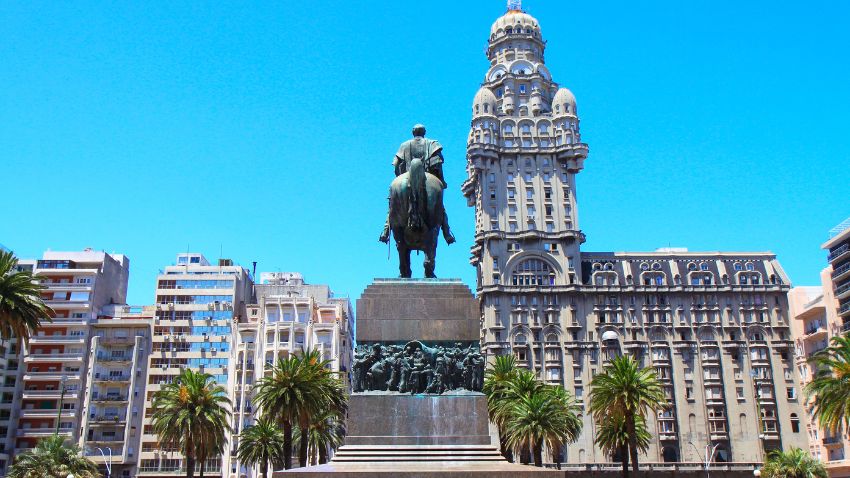
Independence Square, Montevideo, Uruguay
Legal citizenship can be applied for if you are over eighteen and have three years of residency if you have family in Uruguay or five years of residency if you do not. In addition to the residency requirement, you must either be professionally employed in “some science, art, or industry” or own some capital (shares in a business) or property.
In order to apply for citizenship, you must appear before the Electoral Court. They will want to see proof of your right to reside in Uruguay, that your ability to speak Spanish is good, documentation concerning your nationality, age and identity, as well as proof of residence. They will also want to test less tangible things like your belief in democratic ideals, your good behaviour while in Uruguay so far, and ties you might have to Uruguay. Applying for citizenship is free.
If you spend more than half the year in Uruguay, you may become a tax resident there. Uruguay has a territorial tax system, so you do not have to pay any tax there on income earned overseas. Only income sourced from within the country is taxed, so this can be a tremendous advantage when it comes to tax planning if you have a lot of foreign-sourced income. Uruguay has tight bank secrecy laws and a number of free trade zones that entrepreneurs can take advantage of.
Uruguay does have a progressive income tax that caps out at 31%, so it is not by any means a completely tax-free country. If you start a business, then you must also pay contributions based on your employees’ salaries towards social security and other programs at a rate of 12.625%. And there is a flat capital gains tax of 12%. There is also a general VAT of 22%, with a reduced rate of 10% for more essential items like food, medical supplies, and services from hotels.
Uruguay also has a wealth tax, but it is only applicable to your holdings in Uruguay. So, any property that you own in Uruguay will be subject to this tax, although there is an exemption of 4,937,000 pesos or around $123,000 USD for a single individual or $246,000 USD for a couple. And if the property in question is your principal residence, then the tax is only levied at 50% of the property’s value.
Related content: How Expats Can Utilize Uruguay's Political System

Churrasco BBQ in Uruguay
There are many reasons why people move to Uruguay. One of the most compelling reasons is its stable political system, as it’s known as one of the least corrupt countries in Latin America.
Even though Spanish is the official language, and you will have to be able to read and write it to get citizenship, as mentioned above, English is widely spoken throughout the country, especially by the younger generations.
Uruguay has no official religion and guarantees religious freedom to all of its citizens. Anyone can own property in Uruguay. There are no restrictions that only allow citizens to purchase in a specific area. And as mentioned, food is abundant everywhere. Uruguayans produce enough food to feed their country 10’s over.
In conclusion, Uruguay's appeal as a destination for residency is undeniable. Its efficient residency process, welcoming attitude toward residents, breathtaking beaches, and numerous benefits make it an attractive option for individuals and families alike.
If you want the best intel from the expat world, including profitable offshore opportunities, little-known tax-saving strategies, and hard-won insights on immigration, passports, and Plan-B residencies, all delivered to your inbox every single week, then join our daily correspondence, EMS Pulse®. Currently enjoyed by over 84,000 expats and expat-hopefuls worldwide. Fill in the form below to join our newsletter free:

Written by Mikkel Thorup
Mikkel Thorup is the world’s most sought-after expat consultant. He focuses on helping high-net-worth private clients to legally mitigate tax liabilities, obtain a second residency and citizenship, and assemble a portfolio of foreign investments including international real estate, timber plantations, agricultural land and other hard-money tangible assets. Mikkel is the Founder and CEO at Expat Money®, a private consulting firm started in 2017. He hosts the popular weekly podcast, the Expat Money Show, and wrote the definitive #1-Best Selling book Expat Secrets - How To Pay Zero Taxes, Live Overseas And Make Giant Piles Of Money, and his second book: Expats Guide On Moving To Mexico.

Panama’s geographic size is modest, but its global relevance is not. The country connects two oceans and two continents, operates on a dollarized...

Honduras’ newly elected president, Nasry Asfura of the conservative National Party, was sworn in on January 27, 2026. The election, held on November...

For a growing number of Americans, cost-of-living math no longer works. Housing feels harder to reach, everyday costs keep climbing, and long-term...